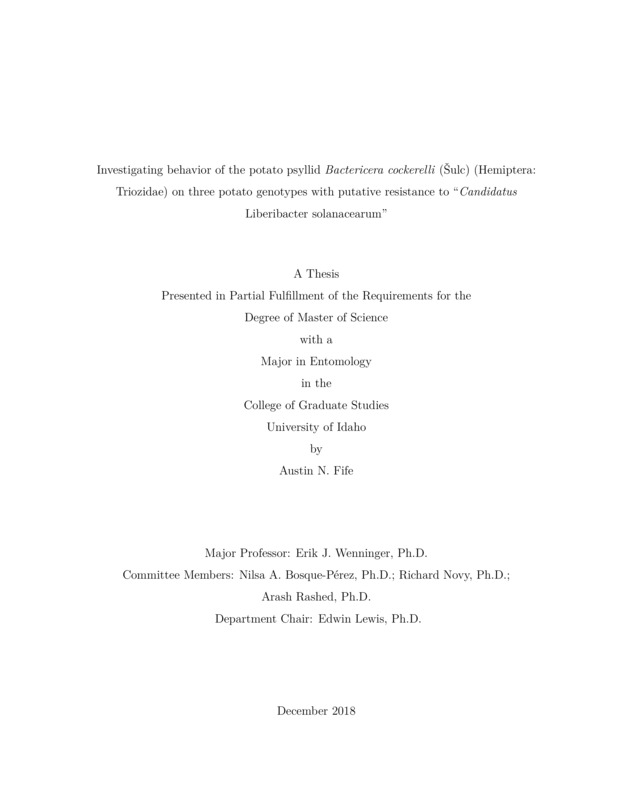Investigating behavior of the potato psyllid Bactericera cockerelli (Šulc) (Hemiptera: Triozidae) on three potato genotypes with putative resistance to “Candidatus Liberibacter solanacearum”
Fife, Austin Nathaniel. (2018-12). Investigating behavior of the potato psyllid Bactericera cockerelli (Šulc) (Hemiptera: Triozidae) on three potato genotypes with putative resistance to “Candidatus Liberibacter solanacearum”. Theses and Dissertations Collection, University of Idaho Library Digital Collections. https://www.lib.uidaho.edu/digital/etd/items/fife_idaho_0089n_11486.html
- Title:
- Investigating behavior of the potato psyllid Bactericera cockerelli (Šulc) (Hemiptera: Triozidae) on three potato genotypes with putative resistance to “Candidatus Liberibacter solanacearum”
- Author:
- Fife, Austin Nathaniel
- ORCID:
- https://orcid.org/0000-0003-4102-3375
- Date:
- 2018-12
- Keywords:
- Bactericera Bactericera cockerelli behavior Liberibacter solanacearum Potato Psyllid
- Program:
- Plant, Soil and Entomological Sciences
- Subject Category:
- Entomology; Zoology; Agriculture
- Abstract:
-
Zebra chip disease (ZC) in potato is associated with “Candidatus Liberibacter
solanacearum” (Lso), which is transmitted by the potato psyllid Bactericera cockerelli
(Šulc) (Hemiptera: Triozidae). Zebra Chip can cause large economic losses when disease
incidence is high. ZC management is currently focused on managing populations of the
psyllid vector with insecticides. Host plant resistance to Lso and ZC has been
investigated, but no commercial potato variety has been found resistant to the pathogen
or the disease symptoms. Three Lso-resistant breeding clones with reduced ZC
symptoms have been derived from a potato relative Solanum chacoense Bitter. Our
study was designed to screen these genotypes for their effects on the psyllid’s host
acceptance behavior and fecundity. The breeding clones selected were: ‘A07781-10LB’
(‘10LB’), ‘A07781-3LB’ (‘3LB’) and ‘A07781-4LB’ (‘4LB’). ‘Russet Burbank’ (Solanum
tuberosum L.) was used as a Lso-susceptible control. We conducted no-choice assays
with intact potato leaflets and observed the following behaviors: probing, walking,
cleaning and leaving the leaf. We also compared oviposition and egg fertility for psyllids
held on these genotypes. Probing frequency and female walking duration were highest
on Russet Burbank, suggesting greater activity on Russet Burbank than on the three
resistant genotypes. Fecundity did not differ among genotypes but declined on all
genotypes during the last period of observation (18-20 days after pairing with a male).
Egg fertility did not differ among genotypes for the first three observation periods
(16-18 days after pairing with a male) but was higher on Russet Burbank than 10LB or
3LB during the last observation period (18-20 days after pairing with a male). For
these genotypes with putative resistance to Lso, we found antibiotic effects on egg
fertility. Our study found little to no evidence of antixenotic or antibiotic effects on
psyllid settling behavior.
- Description:
- masters, M.S., Plant, Soil and Entomological Sciences -- University of Idaho - College of Graduate Studies, 2018-12
- Major Professor:
- Wenninger, Erik J
- Committee:
- Bosque-Pérez, Nilsa A; Novy, Richard; Rashed, Arash
- Defense Date:
- 2018-12
- Identifier:
- Fife_idaho_0089N_11486
- Type:
- Text
- Format Original:
- Format:
- application/pdf
- Rights:
- In Copyright - Educational Use Permitted. For more information, please contact University of Idaho Library Special Collections and Archives Department at libspec@uidaho.edu.
- Standardized Rights:
- http://rightsstatements.org/vocab/InC-EDU/1.0/

